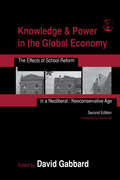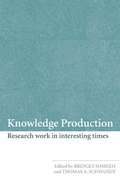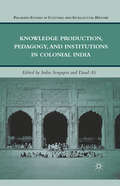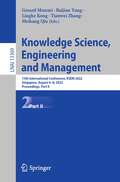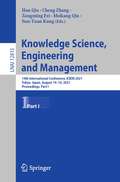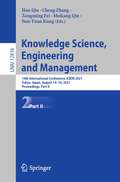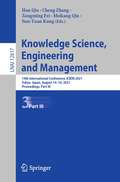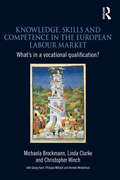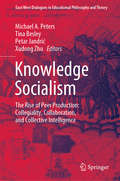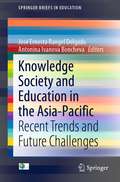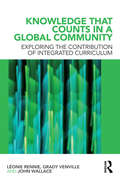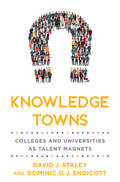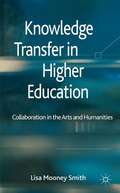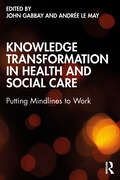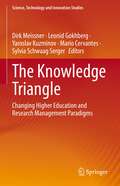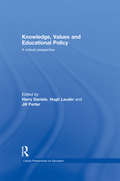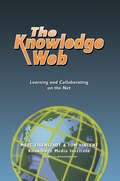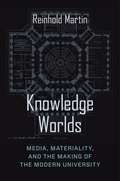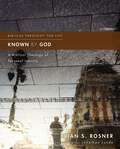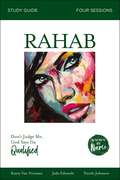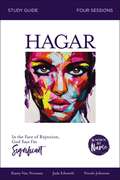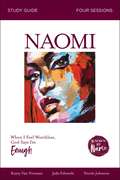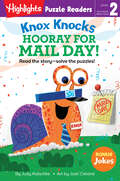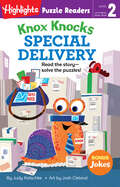- Table View
- List View
Knowledge & Power in the Global Economy: The Effects of School Reform in a Neoliberal/Neoconservative Age (Sociocultural, Political, And Historical Studies In Education)
by David GabbardAdvancing a three-fold political agenda, this volume: * illuminates how the meanings assigned to a whole vocabulary of words and phrases frequently used to discuss the role and reform of U.S. public schools reflect an essentially economic view of the world; * contends that education or educational reform conducted under an economized worldview will only intensify the effects of the colonial relations of political and economic domination that it breeds at home and abroad; and * offers a set of alternative concepts and meanings for reformulating the role of U.S. public schools and for considering the implications of such a reformulation more generally for the underlying premises of all human relationships and activities. Toward these ends, the authors, in Part I, critically examine many of the most commonly used terms within the rhetoric of educational reform since the early 1980s and before. Part II links today's economized worldview to curricular and instructional issues. These essays are especially important for comprehending how the organization of school curriculum privileges those disciplines deemed most central to market expansion--math and science--and how the political centrality of the economic sphere influences the nature of the knowledge presented in specific content areas. Given that language constrains as well as advances human thought, the twin tasks of de-economizing education and decolonizing society will require a vocabulary that transcends the familiar terminologies addressed in Parts I and II. The entries in Part III cultivate the beginnings of such a vocabulary as the authors elucidate innovative concepts which they view as central to the creation of truly alternative educational visions and practices.
Knowledge Production: Research Work in Interesting Times
by Thomas A. Schwandt Bridget SomekhThis collection from a highly impressive international group of educational researchers explores epistemological, methodological, and ethical-political issues in the production of knowledge about educational phenomena in contemporary society. The book is organized in two sections. The first focuses on how the enterprise of knowledge production is being influenced by global discourses of educational accountability, evidence-based practice and policy, and quality assessment. The second section features material that focuses more specifically on reconceiving both methodological matters and the kinds of knowledge that demand attention in this climate. The book is unique in bringing together chapters by scholars well-known internationally for their original contributions to educational theory and research practice. Many books in this area are no more than guides on how to do research or text books reiterating rather narrow frameworks of research paradigms, this book both breaks new ground and sets the tone for discussions about the future path of educational research in the coming years.
Knowledge Production, Pedagogy, and Institutions in Colonial India
by Indra Sengupta Daud AliThis volume seeks to revise the Saidian analytical framework which dominated research on the subject of colonial knowledge for almost two decades, which emphasized colonial knowledge as a series of representations of colonial hegemony. It seeks to contribute to research in the field by analyzing knowledge in colonial India as a dynamic process.
Knowledge Science, Engineering and Management: 15th International Conference, KSEM 2022, Singapore, August 6–8, 2022, Proceedings, Part II (Lecture Notes in Computer Science #13369)
by Gerard Memmi Baijian Yang Linghe Kong Tianwei Zhang Meikang QiuThe three-volume sets constitute the refereed proceedings of the 15th International Conference on Knowledge Science, Engineering and Management, KSEM 2022, held in Singapore, during August 6–8, 2022. The 169 full papers presented in these proceedings were carefully reviewed and selected from 498 submissions. The papers are organized in the following topical sections:Volume I:Knowledge Science with Learning and AI (KSLA)Volume II:Knowledge Engineering Research and Applications (KERA)Volume III:Knowledge Management with Optimization and Security (KMOS)
Knowledge Science, Engineering and Management: 14th International Conference, KSEM 2021, Tokyo, Japan, August 14–16, 2021, Proceedings, Part I (Lecture Notes in Computer Science #12815)
by Han Qiu Cheng Zhang Zongming Fei Meikang Qiu Sun-Yuan KungThis three-volume set constitutes the refereed proceedings of the 14th International Conference on Knowledge Science, Engineering and Management, KSEM 2021, held in Tokyo, Japan, in August 2021.The 164 revised full papers were carefully reviewed and selected from 492 submissions. The contributions are organized in the following topical sections: knowledge science with learning and AI; knowledge engineering research and applications; knowledge management with optimization and security.
Knowledge Science, Engineering and Management: 14th International Conference, KSEM 2021, Tokyo, Japan, August 14–16, 2021, Proceedings, Part II (Lecture Notes in Computer Science #12816)
by Han Qiu Cheng Zhang Zongming Fei Meikang Qiu Sun-Yuan KungThis three-volume set constitutes the refereed proceedings of the 14th International Conference on Knowledge Science, Engineering and Management, KSEM 2021, held in Tokyo, Japan, in August 2021.The 164 revised full papers were carefully reviewed and selected from 492 submissions. The contributions are organized in the following topical sections: knowledge science with learning and AI; knowledge engineering research and applications; knowledge management with optimization and security.
Knowledge Science, Engineering and Management: 14th International Conference, KSEM 2021, Tokyo, Japan, August 14–16, 2021, Proceedings, Part III (Lecture Notes in Computer Science #12817)
by Han Qiu Cheng Zhang Zongming Fei Meikang Qiu Sun-Yuan KungThis three-volume set constitutes the refereed proceedings of the 14th International Conference on Knowledge Science, Engineering and Management, KSEM 2021, held in Tokyo, Japan, in August 2021.The 164 revised full papers were carefully reviewed and selected from 492 submissions. The contributions are organized in the following topical sections: knowledge science with learning and AI; knowledge engineering research and applications; knowledge management with optimization and security.
Knowledge, Skills and Competence in the European Labour Market: What’s in a Vocational Qualification?
by Christopher Winch Linda Clarke Michaela BrockmannFor the free movement of labour across the European Union, establishing transparency and comparability of qualifications across member states is vital. This book examines how qualifications, knowledge, skills and competences are understood in different national contexts and trans-nationally and reveals a complex picture of differences and similarities both within and between countries. Against the background of EU policy initiatives, and in particular the European Qualifications Framework, an important focus is on the prospects and difficulties of establishing cross-national recognition of qualifications. Drawing on case studies of particular sectors and occupations in England, France, Germany and the Netherlands, this insightful book, written by leading academics in the field, will be a vital resource for students and researchers involved with vocational education and training, continuing professional development, human resource management and European Union policy.
Knowledge Socialism: The Rise of Peer Production: Collegiality, Collaboration, and Collective Intelligence (East-West Dialogues in Educational Philosophy and Theory)
by Michael A. Peters Tina Besley Petar Jandrić Xudong ZhuThis is the first collection focusing on knowledge socialism, a particularly apt term used to describe a Chinese socialist mode of production and socialist approach to development and modernity based around the rise of peer production, new forms of collaboration and collective intelligence. Making the case for knowledge socialism, the book is intended for students, teacher, scholars and policy theorists in the field of knowledge economy.
Knowledge Society and Education in the Asia-Pacific: Recent Trends and Future Challenges (SpringerBriefs in Education)
by José Ernesto Rangel Delgado Antonina Ivanova BonchevaThis book explores recent trends in the knowledge-based society and education field in Asia-Pacific and discusses future challenges in the region. It presents studies on the development of scientific thought in the field on the knowledge-based society in the Pacific Circle. This book explores the theoretical framework of the knowledge-based society framed by the borders imposed by the Pacific Ocean, particularly from the perspective of the Pacific Circle Consortium (PCC), in the face of a paradigm shift to satisfy the human needs that must be preserved to guarantee economic and human conditions that future development requires. It analyzes how education relates to the knowledge society in the Asia Pacific region, and considers global issues such as environmental degradation, climate change, pollution, soil erosion, growth of the population. It discusses how these issues concerns parents, educators, civil societies and governments of the countries around the Pacific Circle. This book explores the necessity of changing the current transformative paradigm to one that ensures environmental sustainability, with the support of scientific education and research, as an issue that must be integrated into the curricula in schools at all educational levels.
Knowledge that Counts in a Global Community: Exploring the Contribution of Integrated Curriculum
by John Wallace Léonie J. Rennie Grady VenvilleAs the third millennium progresses, we are faced with increasing pressures relating to climate change and the sustainability of life on Earth. Concerned citizens are realizing that the responsibility to respond is both local and global. There is an increasing sense of urgency about the need to reform the processes of schooling and curriculum to better prepare students for global citizenship. Educators, policy makers and the wider community are seeking information about how to proceed with this reform effort, particularly how alternative and integrated approaches to curriculum can be used to engage students with the important issues of our time. Knowledge that Counts in a Global Community explores the potential contribution of curriculum integration in a context where school curricula are typically segregated by discipline. It offers curriculum integration as a powerful tool for educating young citizens so that they can understand and respond to global concerns. It argues for an informed citizenry who can think broadly across disciplines, and contribute sensibly and pragmatically to local problems with an eye on how this translates to making a global difference. In its examination of the twin themes of global knowledge and curriculum integration, the book explores: the nature of curriculum integration the nature of knowledge the nature of learning The authors reflect on these issues from perspectives gained by more than a decade of research in the area. Their in-depth, scholarly exploration and critical analysis of current approaches to curriculum, introduces educators and academics to contemporary ways of conceptualizing the complexities of, and relationships among curriculum integration, knowledge and learning. Throughout the book, the authors emphasize the central curriculum question, what kinds of outcomes do we want for students of the twenty-first century? This book will provide a valuable resource for academic educators, researchers, teachers and others interested in educational policy reform.
Knowledge Towns: Colleges and Universities as Talent Magnets (Higher Education and the City)
by David J. Staley Dominic D. EndicottThe remote work revolution presents a unique opportunity for higher education institutions to reinvent themselves and become talent magnets.In Knowledge Towns, David J. Staley and Dominic D. J. Endicott argue that the location of a college or university is a necessary piece of any region's effort to attract remote knowledge workers and accelerate economic development and creative placemaking. Just as every town expects a church, bank branch, post office, and coffeehouse, Staley and Endicott write, we will see a decentralized network of institutions of higher education flourish, acting as cornerstones for the post-pandemic rebuilding of our society and economy. In calling for a "college in any town," they are not simply proposing placing a traditional college within a town or city, but envisioning instead a particular kind of higher education institution called a "knowledge enterprise." In addition to providing the services of a traditional college, a knowledge enterprise acts as a talent magnet, attracting workers looking to move to cheaper and more attractive destinations.With the post-COVID-19 shift to more remote work, and millions of people moving to more affordable and livable cities, a place that wants to attract talent will require a thriving academic environment. This represents a new opportunity for "town and gown" to create collaborative communities. The pandemic has accelerated existing trends that put at risk the viability of many colleges and universities, as well as that of many towns and cities. The talent magnet strategy outlined in this book offers colleges and towns a plan of action for regeneration.
Knowledge Transfer in Higher Education
by Lisa Mooney SmithA presentation of four years of close observation of research and knowledge transfer practices in a university. It attempts to contextualise knowledge transfer within the arts and humanities, as well as situate learning about the reception and adoption of it by the individual scholar and the organisation in which they operate.
Knowledge Transformation in Health and Social Care: Putting Mindlines to Work
by John Gabbay Andrée Le MayThe term ‘mindlines’ has become common currency in the world of research implementation and evidence-based practice. This book updates, develops and applies the mindlines model more widely. It sheds light on how we can realistically mobilise and transform research-based evidence into practice in context. This illuminating book shows how the mindlines model can be put to work. It highlights how practitioners collectively share and internalise implicit, flexible ways of rapidly handling complex clinical situations. Drawing on research and reflective studies from practice, education, and guidelines-development across a wide range of international health and care settings, the authors unpack the general components of mindlines. They find practical ways to uncover, bring together and apply specific mindlines to improve practice; and to develop evidence-based healthcare policy, practice and education in ways that capitalise on the crucial role of mindlines. Closely edited by the originators of the mindlines model, this book brings together the work of a cohesive group of researchers and practitioners to showcase and develop its theory and consequences. It is an essential read for all those interested in knowledge mobilisation, evidence-based practice, and research implementation both within healthcare and beyond.
Knowledge Translation in Context
by Anne Marshall Bonnie Leadbeater Elizabeth M. BanisterThe main goal of knowledge translation (KT) is to ensure that diverse communities benefit from academic research results through improved social and health outcomes. But despite growing interest in researcher-user collaborations, little is known about what makes or breaks these types of relationships. Knowledge Translation in Context is an essential tool for researchers to learn how to be effective partners in the KT process.Drawing on expertise and studies from across the globe, Elizabeth Banister, Bonnie Leadbeater, and Anne Marshall outline a variety of perspectives on KT processes. Case studies outline the uses of KT in many contexts, including community, policy, Indigenous, and non-profit organizations. While recognizing the specificity of each situation, Knowledge Translation in Context highlights the most important elements that have led KT to succeed (or fail) as a dynamic, multidirectional process.
The Knowledge Triangle: Changing Higher Education and Research Management Paradigms (Science, Technology and Innovation Studies)
by Dirk Meissner Leonid Gokhberg Yaroslav Kuzminov Mario Cervantes Sylvia Schwaag SergerThis book helps readers understand how universities position themselves in the innovation landscape and the implications for national policies. It provides a scholarly discussion and best practice–based insights to help answer questions like: To what extent do funding and governance policies support activities within the knowledge triangle? How should policies for universities be designed in countries with different industrial and higher education structures? Are there ways to effectively link universities with regional enterprises and social actors? And finally, what are the new institutional models and best practices for overcoming obstacles to interaction, collaboration, and co-creation?
Knowledge, Values and Educational Policy: A Critical Perspective (Critical Perspectives On Education Ser.)
by Harry Daniels Hugh Lauder Jill PorterKnowledge, Values and Educational Policy focuses on what schools are for and what should be taught in them, how learning is possible across boundaries, and issues of diversity and equity. Policies and practices relating to schools are also considered. Within this volume, internationally renowned contributors address a number of fundamental questions designed to take the reader to the heart of current debates around curriculum, knowledge transfer, equity and social justice, and system reform, such as: What are schools and what are they for? What knowledge should schools teach? How are learners different from each other and how are groups of learners different from one another, in terms of social class, gender, ethnicity, and disability? What influence does educational policy have on improving schools? What influence does research have on our understanding of education and schooling? To encourage reflection, many of the chapters also include questions for debate and a guide to further reading. Read alongside its companion volume, Educational Theories, Cultures and Learning, readers will be encouraged to consider and think about on some of the key issues facing education and educationists today.
The Knowledge Web: Learning and Collaborating on the Net (Open and Flexible Learning Series)
by Eisenstadt, Marc Vincent, TomFeaturing contributions from staff and associates of the Knowledge Media Institute at the UK Open University, this text provides a glimpse into the wide variety of projects undertaken in the development and assessment of distance learning technologies.
Knowledge Worlds: Media, Materiality, and the Making of the Modern University
by Reinhold MartinWhat do the technical practices, procedures, and systems that have shaped institutions of higher learning in the United States, from the Ivy League and women’s colleges to historically black colleges and land-grant universities, teach us about the production and distribution of knowledge? Addressing media theory, architectural history, and the history of academia, Knowledge Worlds reconceives the university as a media complex comprising a network of infrastructures and operations through which knowledge is made, conveyed, and withheld.Reinhold Martin argues that the material infrastructures of the modern university—the architecture of academic buildings, the configuration of seminar tables, the organization of campus plans—reveal the ways in which knowledge is created and reproduced in different kinds of institutions. He reconstructs changes in aesthetic strategies, pedagogical techniques, and political economy to show how the boundaries that govern higher education have shifted over the past two centuries. From colleges chartered as rights-bearing corporations to research universities conceived as knowledge factories, educating some has always depended upon excluding others. Knowledge Worlds shows how the division of intellectual labor was redrawn as new students entered, expertise circulated, science repurposed old myths, and humanists cultivated new forms of social and intellectual capital. Combining histories of architecture, technology, knowledge, and institutions into a critical media history, Martin traces the uneven movement in the academy from liberal to neoliberal reason.
Known by God: A Biblical Theology of Personal Identity (Biblical Theology for Life)
by Jonathan Lunde Brian S. RosnerWho are you? What defines you? What makes you, you?In the past an individual's identity was more predictable than it is today. Life's big questions were basically settled before you were born: where you'd live, what you'd do, the type of person you'd marry, your basic beliefs, and so on. Today personal identity is a do-it-yourself project. Constructing a stable and satisfying sense of self is hard amidst relationship breakdowns, the pace of modern life, the rise of social media, multiple careers, social mobility, and so on. Ours is a day of identity angst.Known by God is built on the observation that humans are inherently social beings; we know who we are in relation to others and by being known by them. If one of the universal desires of the self is to be known by others, being known by God as his children meets our deepest and lifelong need for recognition and gives us a secure identity. Rosner argues that rather than knowing ourselves, being known by God is the key to personal identity.He explores three biblical angles on the question of personal identity: being made in the image of God, being known by God and being in Christ. The notion of sonship is at the center - God gives us our identity as a parent who knows his child. Being known by him as his child gives our fleeting lives significance, provokes in us needed humility, supplies cheering comfort when things go wrong, and offers clear moral direction for living.X
Known by Name: Don’t Judge Me; God Says I’m Qualified (Known by Name)
by Kasey Van Norman Jada Edwards Nicole Johnson Karen Lee-ThorpThe women in the Bible asked the same three questions we all still ask today: How does everyone else see me? How do I see myself? How does God see me?Rahab’s story, found in the book of Joshua, is a story of a girl boss, an assertive, confident woman who did what she had to do to provide for her family. Her identity was shaped by her upbringing. With no Bible study to join or podcast to download, Rahab learned her beliefs and behaviors in a culture that believed in gods, not God. But when opportunity knocked, she boldly trusted in the God she had never known, and became something she never imagined–a woman who brought freedom to generations.This Bible study will take you through Rahab’s story as she trusted God’s final word about her worth above society’s. You will learn how to shed unhelpful labels and fears, and instead revel in God’s unconditional love and acceptance of you–just as you are. You can be free from shame and doubt.This study guide features video notes, group discussion questions, and between-session activities like reflecting on the drama and teachings, studying the character story in Scripture, memory verses, and journaling.Sessions include:Your Past Has a PurposeLiking Your ReflectionWhat’s in a ReputationYou Have a ChoiceDesigned for use with Known By Name: Rahab Video Study (9780310096344), sold separately.
Known by Name: In the Face of Rejection, God Says I’m Significant (Known by Name)
by Kasey Van Norman Jada Edwards Nicole Johnson Karen Lee-ThorpThe women in the Bible asked the same three questions we all still ask today: How does everyone else see me? How do I see myself? How does God see me?Hagar’s story, found in Genesis 16, is a story of cultural victimization. She was betrayed, abandoned, and scorned. Her response? She did what most of us would do when deeply hurt by someone we trust–she ran away. She got defensive. She retreated to a place where she felt safe. She felt justified in her anger and hurt. But deep in her core was a woman who longed to be seen and hoped for redemption.This Bible study will take you through Hagar’s story as she learns from hurt and heartache that what is unresolved is not unseen by God. The lack of finality in Hagar’s story teaches us to trust God with the ending–believing he sees us and he knows.This study guide features video notes, group discussion questions, and between-session activities like reflecting on the drama and teachings, studying the character story in Scripture, memory verses, and journaling.Sessions include:Exposing the Lie of ShameRejected to AcceptedTrusting after BetrayalTransformed and SeenDesigned for use with Known By Name: Hagar Video Study (9780310096498), sold separately.
Known by Name: When I Feel Worthless, God Says I’m Enough (Known by Name)
by Kasey Van Norman Jada Edwards Nicole Johnson Karen Lee-ThorpThe women in the Bible asked the same three questions we all still ask today: How does everyone else see me? How do I see myself? How does God see me?Naomi’s story, found in the book of Ruth, is a story of lost identity. She lost her husband and her sons, which in her culture left her completely without a home or a means to support herself. She was a Hebrew woman in Moabite territory, alone among strangers. She reacted by letting her circumstances define her. But even in her angry, fearful, rather dramatic season of feeling like the victim, God kept showing his faithfulness.This Bible study will take you through Naomi’s journey from comfort and security to despair and bitterness; from hopeless drifting to faithful obedience; and from loss to redemption in one short lifetime. We’ll learn that when we go through trauma, loss, and hardship, it’s normal to feel Just. So. Done. Yet God remains close. He is not done. He can and will redeem even in our darkest circumstances.This study guide features video notes, group discussion questions, and between-session activities like reflecting on the drama and teachings, studying the character story in Scripture, memory verses, and journaling.Sessions include:When Hard Times HitBehind the ScenesBetter than Being FixedFrom Bitter to BlessedDesigned for use with Known By Name: Naomi Video Study (9780310096597), sold separately.
Knox Knocks: Hooray for Mail Day! (Highlights Puzzle Readers)
by Judy KatschkeHighlights Puzzle Readers offer an innovative approach to learning that integrates puzzles and stories to develop motivated, confident readers. These Level 2 books are perfect for kids starting to read longer and more complex sentences.Knox, a snail mail carrier, delivers packages with a smile--and a hilarious joke for each recipient. In this pun-filled Level 2 Highlights Puzzle Reader, readers must solve six mazes to help Knox deliver the mail on time for the Mail Day Parade. With bonus knock-knock jokes, Knox Knocks: Hooray for Mail Day! is perfect for beginning readers.
Knox Knocks: Special Delivery (Highlights Puzzle Readers)
by Judy KatschkeHighlights Puzzle Readers offer an innovative approach to learning that integrates puzzles and stories to develop motivated, confident readers. These Level 2 books are perfect for kids starting to read longer and more complex sentences.Knox, a snail mail carrier, delivers packages with a smile--and a hilarious joke for each recipient. In this pun-filled Level 2 Highlights Puzzle Reader, readers must solve six mazes to help Knox deliver the mail with time to spare so he can celebrate his birthday. With bonus knock-knock jokes, Knox Knocks: Special Delivery is perfect for beginning readers.
